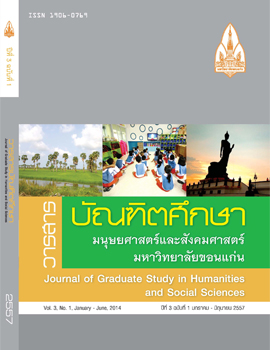ปัจจัยด้านวัจนลีลาที่มีผลต่อการแปรเสียงพยัญชนะท้าย (ん) ในภาษาญี่ปุ่นของนักศึกษามหาวิทยาลัยขอนแก่น
คำสำคัญ:
วัจนลีลา, พยัญชนะท้ายภาษาญี่ปุ่น, Style, Japanese final consonantบทคัดย่อ
งานวิจัยนี้มีวัตถุประสงค์เพื่อศึกษาปัจจัยด้านวัจนลีลาที่มีผลต่อการแปรเสียงพยัญชนะท้าย (ん) ในภาษาญี่ปุ่นของนักศึกษาในมหาวิทยาลัยขอนแก่นโดยมีสมมติฐานว่าอัตราความถูกต้องในการออกเสียงจะเพิ่มมากขึ้นเมื่อผู้เรียนอยู่ในวัจนลีลาที่มีความเป็นทางการมากขึ้น และอัตราความถูกต้องในการออกเสียงระหว่างผู้เรียนทั้งสองกลุ่มจะแตกต่างกันมาก งานวิจัยนี้เริ่มจากการรวบรวมและคัดเลือกคำศัพท์ที่มีเสียงพยัญชนะท้าย (ん) เพื่อใช้ในการทดสอบการออกเสียง ซึ่งการทดสอบนี้จะเรียงลำดับความเป็นทางการของวัจนลีลาจากน้อยไปหามาก ได้แก่ การทดสอบโดยการสัมภาษณ์ (Interview Test), การทดสอบโดยการอ่านข้อความ (PassageReading Test) และการทดสอบโดยการอ่านเป็นคำ (Word Lists Test) โดยในการทดสอบจะแบ่งกลุ่มผู้เข้ารับการทดสอบเป็นสองกลุ่ม คือ นักศึกษาชั้นปีที่ 2 เป็นตัวแทนของกลุ่มผู้มีความรู้ภาษาญี่ปุ่นระดับต้นและนักศึกษาชั้นปีที่ 4 เป็นตัวแทนของกลุ่มผู้มีความรู้ภาษาญี่ปุ่นระดับสูง
ผลที่ได้จากงานวิจัยนี้คือ อัตราความถูกต้องในการออกเสียงพยัญชนะท้าย (ん) ของกลุ่มผู้มีความรู้ภาษาญี่ปุ่นทั้งสองกลุ่มแปรผันตามระดับความเป็นทางการของวัจนลีลา อย่างไรก็ตามอัตราความถูกต้องในการออกเสียงของผู้เรียนทั้งสองกลุ่มกลับไม่ได้แตกต่างกันมากดังสมมติฐานที่ได้ตั้งไว้ นอกจากนี้อัตราความถูกต้องในการออกเสียงระหว่างการทดสอบโดยการอ่านข้อความ (วัจนลีลาที่เป็นทางการ) และการทดสอบโดยการสัมภาษณ์ (วัจนลีลาที่ไม่เป็นทางการ) นั้นแตกต่างกันอย่างชัดเจนมากกว่าการทดสอบโดยการอ่านเป็นคำ (วัจนลีลาที่เป็นทางการที่สุด) และการทดสอบโดยการอ่านข้อความซึ่งแสดงให้เห็นว่าวัจนลีลาที่แตกต่างกันจะส่งผลต่ออัตราการออกเสียงของผู้เรียนที่แตกต่างกัน
Stylistic Variation of Japanese Final Consonant (ん)of Thai Japanese Learners in Khon Kaen University
The purpose of this research is to study the stylistic variation of Japanese final consonant (ん) of learners in Khon Kaen University in order to answer the question that the frequency of correct pronunciation will be increased if learners are in more formal style and the frequency of correct pronunciation of both groups of learners will show an extremely difference. In this research, the data were collected from Japanese vocabulary which have final consonant (ん) in order to use in three styles of the tests; interview, passage reading and word lists test which represent the least formal to the most formal style. The participants were divided into two groups: second year Japanese major students representing lower language proficiency learners and forth year Japanese major students representing higher language proficiency learners. The research found that the frequency of correct pronunciation of final consonant (ん) of both groups correspond to the more formal style.
However, the frequency of correct pronunciation of both groups showed an ordinary difference. Moreover, the frequency of correct pronunciation between passage reading test (formal style) and interview test (informal style) are more obvious difference than word lists test (most formal style) and passage reading test. This research reveals that the difference of formality in style could effect the pronunciation differently.







